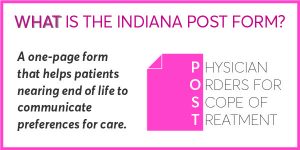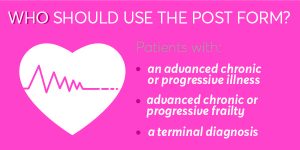$3.5 million grant awarded to study effectiveness of POLST form facilitation

A team led by Regenstrief researcher Alexia Torke, M.D., is exploring if guidance in filling out medical treatment options on the POLST form makes a measurable difference in a person’s care preferences being respected. The advance care planning assistance will be provided by trained nurses. The National Institute of Aging awarded $3.5 million over five years for the study.
The POLST (Physician Orders for Life-Sustaining Treatment) program exists in some form in all 50 states. In Indiana, it is called the POST (Physician Orders for Scope of Treatment) form. Though the forms may have different names across states, the purpose is to allow people who are seriously ill or frail to designate what specific medical treatments they receive or do not receive when they are unable to speak for themselves. The forms are medical orders and include preferences about treatments such as ventilator use, cardiopulmonary resuscitation, and other life-sustaining interventions.

Patients enrolled in the randomized controlled trial may receive the option to complete the Indiana POST form with guidance from a nurse trained in Respecting Choices Advanced Steps, a method of POST facilitation that has been developed to help patients better understand wishes in end-of-life care.
“We hope these care discussions will help give patients and their families more information and support as they make these important decisions,” said Dr. Torke, a research scientist with the Indiana University Center for Aging Research at Regenstrief Institute. “This study will be helpful in determining how to make sure patients understand and make high-quality decisions about their own medical care.”
During discussions, patients will learn more about the various domains of the POLST paradigm, such as feeding tube preferences, resuscitation, antibiotics and more. They will discuss options for each of these domains and have opportunities to clarify any possible misunderstandings with trained experts.
“This kind of facilitation can help ensure POLST orders reflect the values-based, informed preferences of patients and families,” said Susan Hickman, PhD, a co-investigator on the study. Dr. Hickman is director for the IU Center for Aging Research at Regenstrief and a founding member of the National POLST Paradigm. “This innovative study will enable us to assess whether these discussions do a better job in helping ensure medical treatments match patient preferences compared to standard practice.”n addition to her role at Regenstrief, Dr. Torke is the associate chief for the IU School of Medicine Division of General Internal Medicine and Geriatrics and an associate professor. She is also the director of IU Health’s Evans Center for Spiritual and Religious Values in Healthcare.

Dr. Hickman is a professor at the Indiana University School of Nursing and the Cornelius and Yvonne Pettinga Professor of Aging Research at IU School of Medicine. She is also co-director of the IUPUI Research in Palliative and End-of Life Communicating and Training (RESPECT) Signature Center.
In addition to Drs. Torke and Hickman, the study team will include Patrick Monahan, PhD; Lucia Wocial, PhD, R.N., FAAN; and James Slaven, M.S., from IU School of Medicine, as well as Bernard Joseph Hammes, PhD; Carol Montgomery, M.D., FHM, CPE, MHSA; and Sandra Schellinger, MSN, R.N., NP-C of Respecting Choices.









